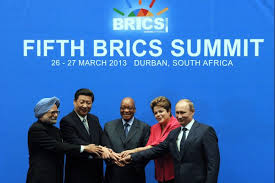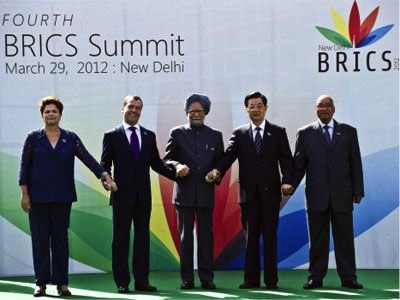So the 5th BRICS Summit has come and gone in Durban South Africa. The first BRICS Summit in Africa; the first hosted by the newest BRICS member South Africa; and the first to be attended by the new Chinese leader, Xi Jinping. I am sure there are a number of other firsts but that will do for the moment.
For the world’s media there were these persistent questions – what is this organization? What does it represent? Do we need to take any notice of it or is this a leader-made media opportunity?
For the experts the questions weren’t really all that much different. It is not at all clear how to assess the impact and influence of this Leaders Summit? And where are we to place this annual leaders gathering in the larger architecture of global summitry?
First, and barely mentioned by either the experts or the global media is the fact that all these BRICS countries are also members of the G20 Leaders Summit. Indeed Russia is not just a member of this leaders gathering but is also a member of the G8 – extant since the late ’90s – and hosting the G20 this coming September in St. Petersburg. Oh and it will shortly host the G8.
By now even the most casual observer knows the annual summit’s origin – at least with respect to the name. Jim O’Neill of Goldman Sachs fame created the BRIC grouping – Brazil, Russia, India and China – as an investment monicker for these large emerging market countries – only to see it appropriated by leaders from those very same countries first by ministers from these countries in 2008 and then in an annual leaders meeting beginning in 2009 at Yekaterinburg in Russia. The original four were joined by South Africa in 2011 at the Summit in Sanya in China.
So what are we to make of this grouping? Is it a developing country alliance – a magnet for developing country concerns; a caucus of large emerging market economies within the G20; or some kind of counterweight – whether in the G20 or not – to the traditional and dominant states in the fashioning and future organization of the global economy.
Let’s start with their accomplishments. At the end of the day analyzing their decisions is an important aspect of global summitry, and worthy of some attention. Like the G7/8 and the G20, the BRICS leaders issue a declaration at the end of each gathering. Now these communiques have been worked on by Sherpas, personal representatives of the leaders, and officials long before the conclusion of the meeting. The current communique issued, the eThekwini Declaration – you can find it at the official BRICS website – or use the BRICS website at the University of Toronto – brought to you by my colleague, Professor John Kirton and the students at University of Toronto as well Marina Larionova of the Higher School of Economics in Moscow and her colleagues.
Well the communique is lengthy and I am afraid not terribly edifying. I was asked by various media outlets what I thought the leaders had to accomplish to consider the Durban Summit a success. I suggested two concluded policies were necessary: the creation of the new BRICS Development Bank (see paragraph 9); and then the Contingent Reserve Arrangement (paragraph 10). But neither was concluded notwithstanding that the Statement declared that both would be established. All the critical detail for both projects still need to be worked out at this point and who knows when, and whether, the BRICS officials will be able to do so.
One other matter seemed to raise interest over the collective influence of the BRICS – this a possible the statement on Syria. Just before the Durban Summit began Bashar al-Assad appealed to the BRICS leaders to help end the two-year conflict in Syria. The appeal raised all sorts of possibilities for involvement of these countries – especially given that Russia but also China – had resisted muscular international efforts, including at the UN, to end the Syrian civil war. So here would be a collective effort in security cooperation among the 5 states. It might bring influence. Paragraph 26 speaks to the BRICS-Leaders’ concerns at the Syrian situation. But other than a statement to permit “unimpeded access to humanitarian organizations” – possibly provision of assistance without notification to the current government, which would be a change in policy – the statement evidenced little in the way of a new initiative.
So a reading of the Declaration reveals little in the way of effective decision making. In reading the experts and the more enthusiastic officials – read that at least as Jacob Zuma – the pendulum swings in the direction of some kind of counterweight – to the traditional states especially the United States. And this view pushes in the direction of suggesting that the global economy and the traditional institutions – World Bank and IMF have failed to adjust and accommodate the rise of these large emerging market economies and that the BRICS somehow can force the pace. Now we all can agree that the reforms promised have failed to keep pace with the promises made at the time of the global financial crisis; but how the BRICS will bring about a more rapid change – I’m afraid I don’t see it though my colleague Oliver Stuenkel at Post Western World thinks it – or at least the BRICS bank possibly will:
The answer is that while emerging powers seek a larger role within the existing framework, they do not feel established powers are willing to provide them with the adequate power and responsibility – reforms at the World Bank and the IMF have been too slow, and not far-reaching enough. The World Bank remains, despite its name, essentially a Western-dominated institution in the eyes of emerging powers. It is difficult to read the creation of the BRICS Development as anything other than that.
Oliver then swings in a very Brazilian direction – that is “state-led economic growth sustained by strong development banks.” This is the possible BRICS consensus. And while there is some attention in the Declaration, see paragraph 18, to what is called State Owned Companies (SOCs) and encouragement to explore cooperation among these companies, there is little substance you can point to to suggest that the development model is the foundation for the BRICS.
So while a counterweight remains possible motivation for the BRICS how is it shaped in the context of the BRICS? Many experts have referred to the BRICS and the character of consensus, or lack thereof. On the latter experts from the traditional countries have alluded repeatedly to the lack of consensus. My friend and colleague from the WTO, John Hancock writing recently in Canada’s Globe and Mail targeted this feature of the BRICS: “But ironically as the BRICS grow more powerful, they also grow more fractious.” Now John acknowledges that the lack of consensus is not restricted to the BRICS, but like-mindedness has always been overrated whether at the BRICS or the G8 or the G20. What’s important, as I argued above, is what gets decided and as we can see from this current Summit there is a long way to go. John suggests, however, that there may be substance to the notion of a counterweight:
The only thing the BRICS clearly share is a smouldering resentment of Western dominance, and a palpable desire for their own place in the sun. Russia is still smarting from its loss of superpower status. China has not forgotten the humiliations of the 19th and early 20th centuries. India still carries heavy colonial baggage, and the South Africa carries even heavier baggage from its grim apartheid past. If your enemy’s enemy is your friend, then the BRICS at least have that in common.
Is it enough? Well rhetorically, maybe but on a developmental level, its seems far fetched. And as John concludes, “But shared covetousness doe not a common agenda make.”
There is no obvious answer at this juncture as to what the BRICS represents but I’m willing to bet that in the medium and longer term. we are far more likely to see the BRICS acting as a caucus within the G20 than anything else. And we have seen it acting that way already. For instance in building policy consensus for committing funds to the IMF, that could be used among other things for the eurozone crisis, the willingness to commit among all the BRICS was concluded after just such a caucus gathering persuading Brazil to commit though it had expressed doubts publicly. Indeed it would be a sad outcome if the BRICS ended up as a counterweight when much hope has been expressed over the expansion of the G8 to the G20 exactly because it brings together at the global summitry level leaders from the large emerging market countries and the traditional states.
As a parting comment there was much idle discussion at the conclusion of the Summit over the name with some suggesting the BRICS should be renamed the BRICSI as there was much discussion about extending membership to include Indonesia. But I and others took care of that long ago – so a sign off for now from Rising BRICSAM
Image Credit: globalpost.com




